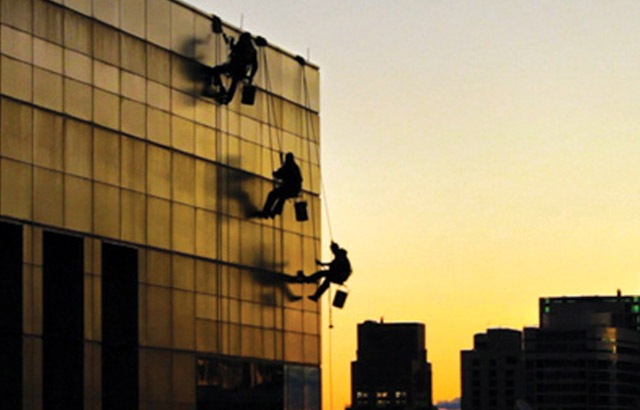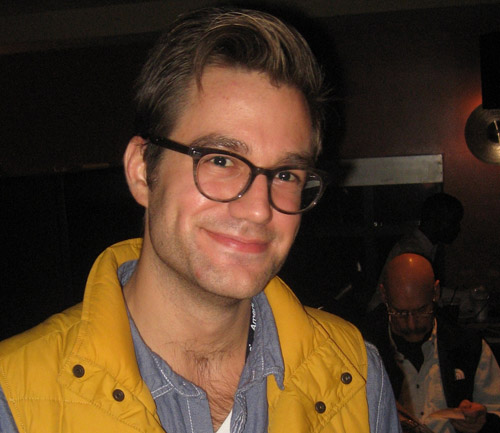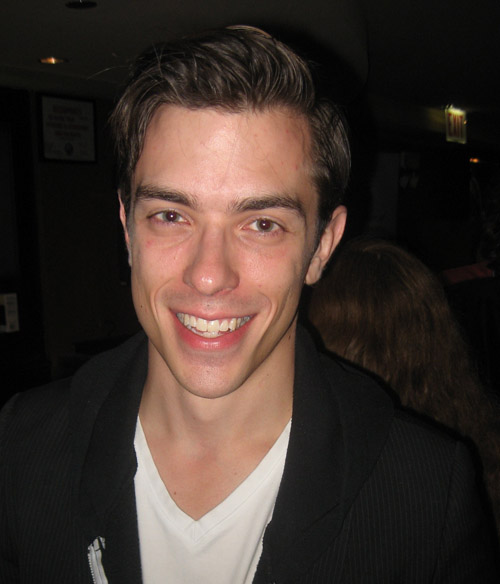CHICAGO– One of the great nights of the Chicago International Film Festival is the “City & State” Short Film program, as local filmmakers from Chicago and the State of Illinois present their work. Directors Nadav Kurtz (“Paradise”), Fawzia Mirza, Ryan Logan (“Queen of my Dreams”), Benjamin Kegan (“After Christmas”) and Brad Bischoff (“Where the Buffalo Roam”) were part of that program and spoke to HollywoodChicago.com.
Before the short films program began, producer Mary Kay Cook of the film “Wednesday’s Child” (directed by Rocco Cataldo) was acknowledged for winning the Illinois Shortcuts film competition, which won them a place in the same City & State presentation. Click here for the HollywoodChicago.com interview of Mary Kay Cook.
 Nadav Kurtz, Director of “Paradise”
Nadav Kurtz, Director of “Paradise”
‘Paradise’ won the Silver Hugo prize in the Short Film competition for Best Documentary at the this year’s Chicago International Film Festival, and is on the short list for Oscar consideration in the same categories.
 Photo credit: Chicago International Film Festival |
HollywoodChicago.com: In a few sentences, describe your film and more importantly what it means to you.
Nadav Kurtz: My film is a meditation on being an outsider, what it means to be alive, to be human and what it means to work while we’re at work. How we deal with a job – in this case window washers – that demands a risk of life.
HollywoodChicago.com: With a non-fiction film, what kind of planning is involved – were you doing any storyboarding or shot lists or was it all just the truth you were trying to capture?
Kurtz: That’s actually a relevant question. My approach in making this film was to have a combination of thought out, shot list type filming and also moments that were off the cuff. The tension was between those two elements – we had to pick certain lenses for the shots as a feeling of surveillance, for example.
HollywoodChicago.com: When you talk about your love of filmmaking or film in general, what do you talk about primarily?
Kurtz: It’s about honesty and truth, and that comes from the intimacy I wanted to get from these men, who I don’t know very well and probably won’t ever know as well as their families know them. How do I capture something that is close to their heart. Everything else came out of that. I knew I would have a good looking film aesthetically, because Chicago has a beautiful skyline, and the guys work in the heights. It was crucial that I find something about these men that they could share that was unique.
HollywoodChicago.com: Finally, in the film that influences you the most as a director, what is your favorite scene and why?
Kurtz: Someone who I watch in the documentary genre is Steve James, the director of ‘Hoop Dreams.’ I can’t tell you specific scenes, but it was more about the incredibly true story about real people and situations, so epic and dramatic, that it opened my eyes to the possibility of what non-fiction film can be.
 Co-directors Fawzia Mirza, Ryan Logan of “Queen of my Dreams”
Co-directors Fawzia Mirza, Ryan Logan of “Queen of my Dreams”
Photo credit: Patrick McDonald for HollywoodChicago.com |
HollywoodChicago.com: In a few sentences, describe your film and more importantly what it means to you.
Fawzia Mirza: In three words, it’s a film about Bollywood, drag and identity. For me, it’s a story that I’ve had in the queer community, being Pakistani, Muslim and South Asian.
Ryan Logan: For me, it’s a film about Fawzia. I like the idea that it’s a universal story that translates love using Bollywood as a vehicle, and it communicates to everyone. It doesn’t matter that it’s two women, it was still universal. I was glad to be programmed in this category, other than the gay film section, just because of the universality of the film.
HollywoodChicago.com: What plan in pre-production do you like to use – storyboards, shot lists or do you just like to seat-of-the-pants your films?
Mirza: With this project, and projects that Ryan and I – and our DP Amanda Clifford – it’s that this is just a project we’d like to work on, and we’re very collaborative on how we work on it. It’s about the passion and energy, I guess it would be seat of the pants…[laughs]
Logan: I like to plan, and I like advance notice, but Fawzia is about calling me and saying ‘we’re doing this.’ And I always say, ‘great I’ll think about it’ and she comes back with ‘I’ve already booked it, it’s happening tomorrow, are you free?’ [laughs] That’s how it goes.
HollywoodChicago.com: When you talk about your love of filmmaking or film in general, what do you talk about primarily?
Mirza: I’m an actor first, a filmmaker second. But what I love about filmmaking is that I truly see this need to tell the stories I don’t see depicted of world that I know, I want to tell those stories. What I love is that now is the time I can create them. And Ryan as a collaborator is able to make that real in a way I never thought possible.
Logan: The reason we worked well together is that we’re both interested in pushing the form of film, and how we tell the story, in addition to what the film is about. It’s hard for me to connect to any filmmaker who doesn’t feel that way. It’s not only the story, it’s the way we tell, and that validates my reason for making a film.
HollywoodChicago.com: Let’s talk about the term ‘queer cinema.’ As a film critic, I don’t like to categorize films per se, but I know there is an identity aspect to the term. How do you think that avenue has made you more free as filmmakers, knowing that your addressing those identity issues?
Logan: Gay filmmakers are in conflict, because those issues are on everybody’s mind. They are worried about overly ‘normalizing’ something. As a gay person myself, when I lived in Boston there were few gay bars, as everyone there just mixed in straight clubs. I had come from a town which had a more open gay community, so in Boston it was harder to access just because it was more mainstream. That’s how it is in the gay film community – am I going to make something that will cater to a mainstream festival or gay community? I feel like the new gay cinema has the freedom of, ‘we don’t have to choose.’ We don’t apologize in our film for the relationship we depict.
HollywoodChicago.com: Finally, in the film that influences you the most as a director, what is your favorite scene and why?
Mirza: My motivation for this film was love and Indian cinema. Films specifically are harder, but the songs are so influential, which is the title of our film, ‘The Queen of my Dreams.’ That is what we’re searching for, that has been my quest in life and love, and the reason I became a director as well as an actor.
Logan: I wish mine was as sentimental. [laughs] I would say for me, as a gay boy from Kansas, it would be ‘Bad Education’ from Pedro Almodóvar. My favorite scene was the closing sequence, where it all wraps up. It was the first time for me that I had access to something so non-traditional or non-mainstream. It was the first film also that I saw, where I thought, ‘god, I wish I had made that.’ It taught me story movement, transitions and creative flow. And in that epic ending, after it was done, I wanted to die, because it was so gorgeous. It set off the feeling of ‘this is what I was meant to do.’
 Benjamin Kegan, Director of “After Christmas”
Benjamin Kegan, Director of “After Christmas”
 Photo credit: Patrick McDonald for HollywoodChicago.com |
HollywoodChicago.com: In a few sentences, describe your film and more importantly what it means to you.
Benjamin Kegan: It’s a short film about a twentysomething kid who is home for the holidays, the holidays are over and maybe he wants to move back home. It’s about the comfort of returning home, how it wears on your parents and how it can be indulgent. Personally to me, it’s about how the relationship with your parents change in that particular point in your life. The tables turn a bit, my relationship has gotten closer with my parents, but I also realized I can’t get away with some of the things that I had done when I was younger.
HollywoodChicago.com: How do you think it represents the generation that is – as we keep hearing on the news lately – letting go of their parental and home relationships and striking out into the world themselves?
Kegan: It’s hard for many people. The generation that I am a part of graduated from college at a time when it was much more difficult to get a job, so that’s a big part of it, so the comfort of the nest becomes so much more appealing. Plus so many of us were raised in nostalgia, so there is a tendency to cling to the past. We need to get over it. [laughs]
HollywoodChicago.com: When you talk about your love of filmmaking or film in general, what do you talk about primarily?
Kegan: What is fun about film is that it is extremely collaborative. You have this idea as a director and writer as to where you want to go, but you can’t control everything. It’s about bringing in the cinematographers, the actors, producers which bring in the ideas. Then you step back and see how much better and more interesting than what you initially came up with, even in the rehearsal process for the actors. Their rapport turned up the humor in the piece, that’s the direction we went into. It’s about discovery.
HollywoodChicago.com: Finally, in the film that influences you the most as a director, what is your favorite scene and why?
Kegan: For this film, we look at Woody Allen’s dramatic films, ‘Interiors’ was actually huge. We wanted the lighting, the feeling of home and niceness, we wanted to capture it. We thought that Allen really knows how to capture a home warmly, so we went with that.
 Brad Bischoff, Director of “Where the Buffalo Roam”
Brad Bischoff, Director of “Where the Buffalo Roam”
To find out where HollywoodChicago first met Brad Bischoff, click here.
 Photo credit: Patrick McDonald for HollywoodChicago.com |
HollywoodChicago.com: In a few sentences, describe your film and more importantly what it means to you.
Brad Bischoff: It’s a very personal film for me. I grew up in the safety of the suburbs, with my brothers Wesley and Tyler. Tyler was in the film, and we have connected in a way where we’ve become each other’s best friends. It got to the point were we would run around the suburbs, with a backpack, just to explore and feel alive. So Ty and I, when I moved out, that this kind of exploration wouldn’t happen again, because he was moving on as well. I have a hard time living in these moments, knowing that they will not happen again. So I told Ty that we needed to make a film, we need to capture this relationship. It’s a film about a beautiful moment in time, before we all went our separate ways.
HollywoodChicago.com: You said in the Q&A that you are also a person who has a hard time facing change. When did that worldview alter for you?
Bischoff: It was after a break-up, and when I was moving to the city. It was the first time that I had no choice. I got the apartment, I started living in it and that doesn’t mean that everything is okay, but I was comfortable living in that change.
HollywoodChicago.com: What plan in pre-production do you like to use – storyboards, shot lists or do you just like to seat-of-the-pants your films?
Bischoff: For previous films, I approached it differently than ‘Where the Buffalo Roam.’ This one was very improvisational. We had a script, but as soon we started filming we threw it away. We filmed it in wide takes, to take our time with it, and with the camera being far away we could forget about everything around us, and live as brothers. Ty had never acted before. My producer, Bob Zegler, was there with us for every rehearsal, and the idea was to make Ty comfortable being in front of a camera. So the most important thing in pre-production became the rehearsal process, between my brother and I. It’s easy to be brothers, but once you start acting in a film as brothers, it can be terrible and terrific at the same time.
HollywoodChicago.com: When you talk about your love of filmmaking or film in general, what do you talk about primarily?
Bischoff: To give you an example of this, I was madly in love with my high school sweetheart and in the film you see me carrying a backpack, which was filled with everything that reminded me of that love. And Ty keeps telling me to take it off, take it off. But you can’t sometimes, that’s how love feels.
HollywoodChicago.com: Finally, in the film that influences you the most as a director, what is your favorite scene and why?
Bischoff: He was here tonight, Malik Bader, the director of ‘Street Thief.’ It blew me away. This film changed my life, inspired me to approach film in the way I do. Then I saw him here tonight, and I met him for the first time. It was a really good moment.
 | By PATRICK McDONALD |